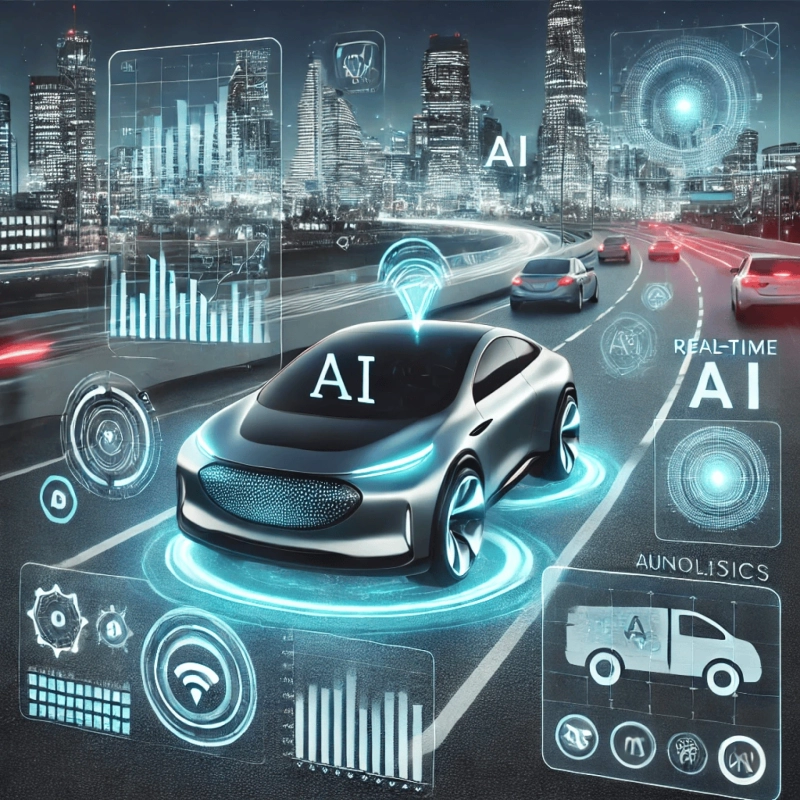The automotive industry is undergoing a major transformation, fueled by artificial intelligence. From autonomous driving and predictive maintenance to smart manufacturing and AI-powered customer experiences, companies are leveraging AI to reshape how vehicles are designed, produced, and operated. This shift is not just about making cars smarter it’s about redefining mobility, efficiency, and safety.
Leading automotive and technology companies are investing heavily in AI solutions, pushing the boundaries of what’s possible. While some are pioneering self-driving technology, others are optimizing factory automation, supply chains, and in-car experiences. In this article, we explore ten companies that are shaping the future of the automotive industry.
1. DTskill
DTskill is a Generative AI enterprise solutions provider specializing in digital transformation across industries, including automotive. With experience in manufacturing, supply chain, and process automation, DTskill develops AI models tailored to improve efficiency, productivity, and decision-making.
One of its major contributions to the automotive sector is AI-powered predictive maintenance, which helps manufacturers detect potential machine failures before they occur, reducing downtime and operational costs. Additionally, DTskill’s AI-based procurement solutions streamline supply chains by forecasting demand and optimizing vendor selection, ensuring seamless production cycles.
In automotive manufacturing, DTskill integrates computer vision for quality control, helping detect defects in real-time. Its customer support automation also enhances after-sales service, allowing automakers to handle service requests more efficiently. With a focus on intelligent process automation, DTskill is helping automotive companies enhance their operational efficiency and improve customer engagement.
2. Tesla
Tesla is widely recognized for its advancements in autonomous driving technology and AI vehicle software. The company has developed a sophisticated neural network-powered vision system, enabling vehicles to navigate roads, detect obstacles, and respond to traffic conditions.
Tesla’s Full Self-Driving (FSD) system continues to evolve, leveraging deep learning models that analyze millions of real-world driving scenarios. The company’s proprietary Dojo supercomputer trains these AI models, improving vehicle autonomy with each software update. Beyond autonomy, Tesla integrates AI into battery management, in-car voice recognition, and smart energy optimization, making its electric vehicles more efficient.
3. Waymo
A subsidiary of Alphabet, Waymo is a leader in autonomous vehicle technology, developing self-driving taxis and delivery services. Its Waymo Driver system combines AI-powered perception models, sensor fusion, and deep learning to navigate urban environments safely.
Waymo’s AI technology allows vehicles to recognize pedestrians, cyclists, and road signs with high precision. The company’s fleet of autonomous taxis operates in select cities, demonstrating the potential for mobility services. With a focus on safety and reliability, Waymo is setting the standard for commercial self-driving solutions.
4. NVIDIA
NVIDIA is a key player in automotive innovation, providing advanced AI computing platforms for autonomous and connected vehicles. Its NVIDIA DRIVE platform enables automakers to develop AI-powered driver-assistance systems, real-time decision-making, and sensor fusion capabilities.
By leveraging AI for computer vision, voice recognition, and infotainment systems, NVIDIA supports the development of smart in-car experiences. The company’s deep learning models process real-time traffic data, improving safety and enhancing autonomous navigation. NVIDIA’s AI chips are integrated into many leading self-driving car prototypes, powering next-generation vehicle intelligence.
5. Mobileye
Mobileye, an Intel subsidiary, is known for its Advanced Driver Assistance Systems (ADAS), which enhance vehicle safety through AI-powered collision detection and lane-keeping assistance. The company develops computer vision-based perception systems, enabling cars to recognize objects, road conditions, and potential hazards.
Through its REM mapping technology, Mobileye creates high-definition maps that assist autonomous vehicles in navigating diverse environments. The company is also working on fully autonomous vehicle solutions, collaborating with automakers to integrate AI-powered safety features into production vehicles.
6. Bosch
Bosch is a global leader in automotive technology, developing solutions for automated driving, smart manufacturing, and connected mobility. The company’s AI-powered driver-assistance systems enhance vehicle safety, while its predictive maintenance solutions optimize factory operations.
Bosch’s AI-based sensor technology enables vehicles to detect obstacles, pedestrians, and environmental changes with high accuracy. In manufacturing, the company utilizes AI for quality control, defect detection, and process automation, improving production efficiency for automakers.
7. Aurora
Aurora is focused on AI-powered autonomous trucking, developing self-driving solutions to improve logistics and freight transport. The company’s Aurora Driver system integrates deep-learning algorithms that enable trucks to navigate highways safely.
By leveraging AI for route planning, fuel efficiency optimization, and real-time traffic analysis, Aurora is making long-haul transportation more efficient. The company’s AI models are continuously trained using real-world driving data, enhancing safety and reliability in autonomous freight operations.
8. Argo AI
Argo AI is developing self-driving technology for ride-sharing and commercial vehicle applications. The company’s AI systems use LIDAR, radar, and computer vision to detect road conditions, making autonomous vehicles safer and more adaptable.
Argo AI’s technology is being integrated into urban mobility solutions, supporting ride-hailing services and smart city initiatives. The company collaborates with automakers to refine AI-powered vehicle perception and navigation systems.
9. Zoox
Zoox, an Amazon-backed company, is building fully autonomous, electric robotaxis designed for urban environments. The company’s AI-powered 360-degree perception system enables vehicles to detect and respond to surrounding traffic.
With a focus on AI ride-sharing solutions, Zoox is pioneering a driverless mobility ecosystem that prioritizes safety, comfort, and sustainability. Its AI models continuously adapt to real-world driving conditions, improving autonomous vehicle performance.
10. Hyundai AI Lab
Hyundai’s AI division is advancing smart vehicle technology, focusing on infotainment, predictive maintenance, and driver-assistance systems. The company is investing in autonomous vehicle research, developing AI-powered models for adaptive cruise control and accident prevention.
By integrating AI into voice recognition, navigation, and diagnostics, Hyundai aims to enhance the in-car experience. Its predictive analytics help monitor vehicle health and suggest maintenance before failures occur, ensuring better safety and efficiency.
The Future of AI in Automotive
As AI continues to evolve, the automotive industry is expected to see major advancements in autonomous driving, predictive analytics, and smart mobility. AI-powered supply chain management will optimize production efficiency, while computer vision and machine learning will enhance vehicle safety. The rise of connected vehicles will lead to more seamless integration between AI systems, creating a fully automated transportation ecosystem.
The future will also bring Generative AI sustainability solutions, improving energy efficiency in electric vehicles and optimizing urban mobility. Automakers and technology companies will need to navigate regulatory challenges and ethical considerations, to ensure AI-powered systems remain safe and reliable.
Final Thoughts
AI is no longer a futuristic concept in the automotive industry it’s a driving force of innovation. From autonomous fleets to AI-powered manufacturing, these companies are shaping the future of mobility. As AI technology advances, we can expect safer, smarter, and more efficient transportation systems that redefine how people and goods move.



